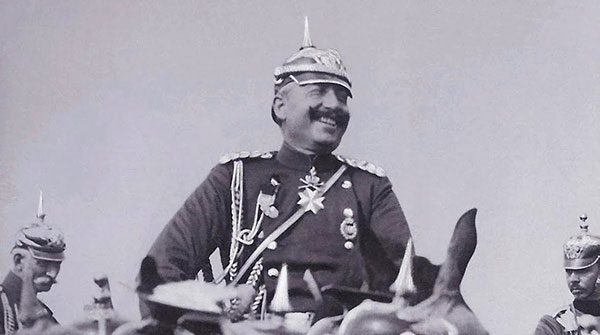What if Germany had won the First World War? How would the world look today?
 In asking the question of who was to blame for the First World War, my last column also touched on what might have happened if Britain had chosen to step aside from the conflict. Bottom line, Germany would almost certainly have won what would have been a much shorter war. And at least two consequences would have followed.
In asking the question of who was to blame for the First World War, my last column also touched on what might have happened if Britain had chosen to step aside from the conflict. Bottom line, Germany would almost certainly have won what would have been a much shorter war. And at least two consequences would have followed.
As continental hegemon and in keeping with its stated war aims, Germany might have imposed a customs union centred on Berlin. Think of it as an authoritarian prototype for the modern European Union.
And as Germany’s ally, the Ottoman Empire would have lasted at least a while longer, in consequence of which the map of the Middle East might look quite different than it does today. Prior to the post-war Ottoman collapse, the following modern countries were Ottoman possessions and thus didn’t exist as defined, independent entities: Turkey, Iraq, Saudi Arabia, Lebanon, Syria, Jordan, and Israel.
 Kaiser Wilhelm |
| Related Stories |
| Pack up your troubles in your old kit-bag
|
| Did the Great War really create a distinct Canadian identity?
|
| Was the Armistice of 1918 a triumph or tragedy?
|
While historical “what ifs” are necessarily speculative, it’s interesting to think about other things that might have evolved differently.
Take Britain as an example. Spared the human and financial costs of the carnage, it would have entered the ensuing decades in a different, more robust, frame of mind. And London would have been better positioned to face New York’s challenge to its role as global financial capital.
Anglo-Irish relations might also have been more benign. After great contention, Westminster had enacted an Irish Home Rule bill in 1914, but its implementation was suspended for the duration of the conflict. While the bill’s scope was unlikely to satisfy the more nationalist elements in Irish opinion, it’s reasonable to think that – had it taken effect in 1914 – the presence of a Dublin parliament might have precluded the violence that transpired later in the decade and also the post-independence civil war that subsequently poisoned Irish politics for much of the 20th century.
One thing it wouldn’t have solved, though, is the long-running issue of Irish partition. The unionist majority in the northeast was adamantly opposed to loosening its connection with the United Kingdom or being in any way subservient to a Dublin parliament. And there was no prospect of their being forcibly coerced. Accordingly, the final negotiations around the Home Rule bill had acknowledged that some sort of compromise would be necessary. What remained were questions around whether the northeast could opt out temporarily or permanently, and how many counties would be involved.
As for Canada, it would never have been involved in the First World War if Britain had stood aside. But with Britain in, English-speaking Canada enthusiastically signed up and nearly 620,000 Canadians served, more than 80 percent of whom were volunteers. Approximately 60,000 died.
It’s become standard for historians to regard the war as a seminal event in the formation of a distinct Canadian identity. The horror and heroism associated with Ypres, Vimy Ridge and Passchendaele are believed to have had a congealing effect on loyalties. To quote a veteran, “We went up Vimy Ridge as Albertans and Nova Scotians. We came down as Canadians.”
But while the war may have encouraged a sense of distinctiveness and unity in English Canada, it can be charged with having a sundering effect overall. Although it had nearly 30 per cent of the population, French Canada only provided around four per cent of the volunteers, a fact that English Canada deeply resented. Then the 1917 introduction of conscription viscerally angered Quebec opinion, leaving long-lasting bitter memories.
The most tantalizing “what ifs” pertain to the murderous ideologies that took root in the war’s bitter aftermath – Bolshevism and Nazism. Would they have found such fertile ground if Germany had won a much shorter war?
Writing a quarter-century ago, historian Niall Ferguson floated this scenario: “With the Kaiser triumphant, Adolf Hitler could have eked out his life as a mediocre postcard painter and a fulfilled old soldier in a German-dominated Central Europe about which he could have found little to complain. And Lenin could have carried on his splenetic scribbling in Zurich, forever waiting for capitalism to collapse …. It was, after all, the German army which sent Lenin back to Petrograd to undermine the Russian war effort in 1917.”
Granted, German hegemony in continental Europe would have been unpalatable for many, particularly countries like France and Belgium. But compared to the twin evils that filled the void in the subsequent decades, it might have been a relative bargain.
Troy Media columnist Pat Murphy casts a history buff’s eye at the goings-on in our world. Never cynical – well, perhaps a little bit.
For interview requests, click here.
The opinions expressed by our columnists and contributors are theirs alone and do not inherently or expressly reflect the views of our publication.
© Troy Media
Troy Media is an editorial content provider to media outlets and its own hosted community news outlets across Canada.

